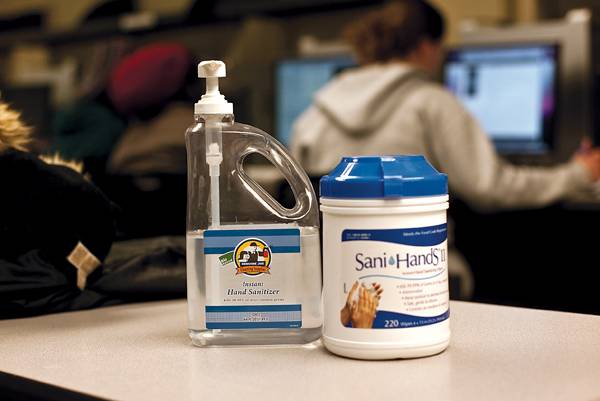University asks those with flu to stay home

Antibacterial soaps are available in classrooms. Photo: Karuna Ang/Iowa State Daily
December 8, 2009
Students, faculty and staff have all been affected by the H1N1 virus as it made its way onto campus and into the classrooms and offices at Iowa State.
The university encourages students who contract the flu to stay home and rest, but with classes still in session, students may feel they still need to attend class and teachers might not know how to handle absences.
Iowa State has taken steps to communicate what the proper methods are for handling this situation. While Iowa State has been seeking guidance from the Centers for Disease Control and Prevention in dealing with the H1N1 outbreak, David Holger, associate provost, has sent out letters to faculty and staff on how to handle the absences of students due to H1N1.
According to one recommendation to instructors: “Incorporate reasonable and flexible policies regarding student absences (due to illness) from classes, labs, or studio courses.”
According to another, instructors are encouraged to: “Provide students with a reasonable opportunity to make up missed work to enable them to complete a successful semester.”
Students can find the letter by visiting the ISU Web site and clicking on the H1N1 resources link.
Confusion has also arisen about whether students need to provide doctor’s notes in order for their absence to be counted as “excused.” Students do not technically need to display a doctor’s note to be considered excused from class.
Dr. Robyn Engstrom, staff physician at the Thielen Student Health Center, said, “I have had a few cases where students have asked for a doctor’s note, and we just explain to them that we are not doing that and their professors should be aware of it.”
According to another line of Holger’s letter to instructors: “Do not expect to receive a health care provider’s certification that a student has had the flu. It is impractical and unreasonable to expect that health care resources can be devoted to providing such documentation.”
Michelle Hendricks, director of the Thielen Student Health Center, stated, “This is a big place with a lot of little pockets everywhere, and getting that kind of word out to everybody with the same level of understanding is challenging. With that said, I think that things have gone pretty well, and I would say it has been a success.” Engstrom also felt that the methods for dealing with the H1N1 outbreak affecting classes have gone smoothly and will continue to do so as the second wave of flu is yet to come.
“In addition to H1N1, the seasonal flu hasn’t even hit yet,” Engstrom said. “We expect to begin seeing cases of the seasonal flu come early January, especially after break when everyone has been traveling and will bring back more germs from home.”
Engstrom said staying home and getting adequate rest is the best thing students can do if they have the flu.
“The key is that for the most part people don’t need to seek medical attention with the flu; they really just need to follow self-care guidelines, rest and recover. There really isn’t any prescription that they need,” Engstrom said.
Hendricks suggested anyone who has questions or concerns go to the ISU Web site and read the letter written by the associate provost on what to do in classroom situations. If students have further questions, they can contact the associate provost’s office at 515-294-7184.
“We want to encourage students to recognize what’s going on, stay home and take good care of themselves. That is the key to keep the spreading down and not have students feel like they need to go to class in spite of being ill,” Hendricks said. “We want to get the word out that it’s in everyone’s best interest for faculty, staff and students to stay home if they catch the flu.”
















